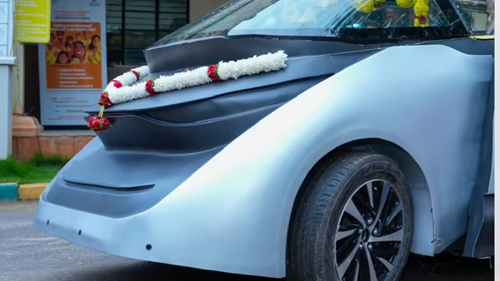In a landmark moment for India’s technology and automotive industries, a driverless car developed jointly by Wipro, the Indian Institute of Science (IISc), and RV College of Engineering was unveiled for the first time in Bengaluru. The autonomous vehicle — designed and built entirely in India — represents a major leap forward in the nation’s pursuit of homegrown artificial intelligence and smart mobility solutions.
The unveiling event drew widespread attention both from the tech community and the general public. A video of Sri Satyatmateertha Swamiji, a respected spiritual leader, taking a ride in the driverless car quickly went viral, symbolizing India’s blend of spiritual tradition and scientific innovation.
The driverless car project is the result of a multi-institutional collaboration combining industrial expertise, academic research, and advanced AI systems.
Wipro led the development of the vehicle’s software and cloud integration.
IISc Bengaluru provided cutting-edge research in machine learning, sensor fusion, and robotics.
RV College of Engineering contributed to the design, mechanical engineering, and real-world testing of the prototype.
According to the research team, the car uses LiDAR, radar, GPS, and advanced neural networks to navigate complex traffic conditions, recognize road signs, and make instant driving decisions — all without human intervention.
“This marks a historic milestone for Indian innovation,” said Dr. Anil Kumar, project head from IISc’s Department of Artificial Intelligence. “Our goal was to demonstrate that world-class autonomous vehicle technology can be conceived, designed, and built right here in India.”
Wipro’s Chief Technology Officer Rohit Adlakha described the project as a “vision for safer, smarter, and more sustainable mobility,” noting that the company plans to collaborate further with government agencies for pilot testing on controlled city routes.
The presence of Sri Satyatmateertha Swamiji during the demonstration added a unique dimension to the event. His calm demeanor during the test ride drew smiles from onlookers as he praised the engineers for their innovation, saying, “Technology that serves humanity and reduces human error is a form of divine progress.”
Following the successful showcase, plans are underway to conduct field trials across Bengaluru’s technology corridors under regulatory supervision. The research team aims to achieve Level 4 autonomy within the next two years — meaning the vehicle will operate fully autonomously in most conditions.
A New Chapter for Indian Innovation
India’s unveiling of its first indigenously developed driverless car is being hailed as a turning point in the country’s AI and mobility ecosystem, potentially positioning India alongside global leaders such as the U.S., Japan, and Germany in autonomous technology research.
As Bengaluru — the country’s tech capital — continues to push boundaries, the driverless car project stands as a shining example of how collaboration between industry, academia, and innovation can drive the future of smart mobility.







